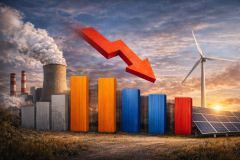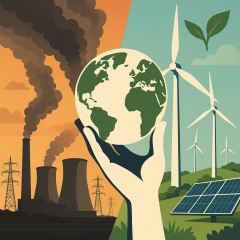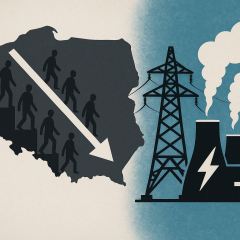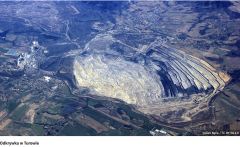Governor of the Bank of England Mark Carney says firms that will ignore climate change will go bankrupt. Does PZU, PGE, Energa, Enea, ZE PAK share this opinion?
Firms ignoring climate crisis will go bankrupt, says Mark Carney
Bank of England governor warns of financial collapse linked to climate emergency.
Companies and industries that are not moving towards zero-carbon emissions will be punished by investors and go bankrupt, the governor of the Bank of England has warned.
Mark Carney also told the Guardian it was possible that the global transition needed to tackle the climate crisis could result in an abrupt financial collapse. He said the longer action to reverse emissions was delayed, the more the risk of collapse would grow.
Carney has led efforts to address the dangers global heating poses to the financial sector, from increasing extreme weather disasters to a potential fall in asset values such as fossil fuel company valuations as government regulations bite. The Guardian revealed last week that just 20 fossil fuel companies have produced coal, oil and gas linked to more than a third of all emissions in the modern era.
The Bank of England has said up to $20tn (£16tn) of assets could be wiped out if the climate emergency is not addressed effectively. But Carney also said great fortunes could be made by those working to end greenhouse gas emissions with a big potential upside for the UK economy in particular.
The Guardian has collaborated with leading scientists and NGOs to expose, with exclusive data, investigations and analysis, the fossil fuel companies that are perpetuating the climate crisis – some of which have accelerated their extraction of coal, oil and gas even as the devastating impact on the planet and humanity was becoming clear.
The investigation has involved more than 20 Guardian journalists working across the world for the past six months.
The project focuses on what the companies have extracted from the ground, and the subsequent emissions they are responsible for, since 1965. The analysis, undertaken by Richard Heede at the Climate Accountability Institute, calculates how much carbon is emitted throughout the supply chain, from extraction to use by consumers. Heede said: "The fact that consumers combust the fuels to carbon dioxide, water, heat and pollutants does not absolve the fossil fuel companies from responsibility for knowingly perpetuating the carbon era and accelerating the climate crisis toward the existential threat it has now become."
One aim of the project is to move the focus of debate from individual responsibilities to power structures – so our reporters also examined the financial and lobbying structures that let fossil fuel firms keep growing, and discovered which elected politicians were voting for change.
Another aim of the project is to press governments and corporations to close the gap between ambitious long-term promises and lacklustre short-term action. The UN says the coming decade is crucial if the world is to avoid the most catastrophic consequences of global heating. Reining in our dependence on fossil fuels and dramatically accelerating the transition to renewable energy has never been more urgent.
SOURCE:








